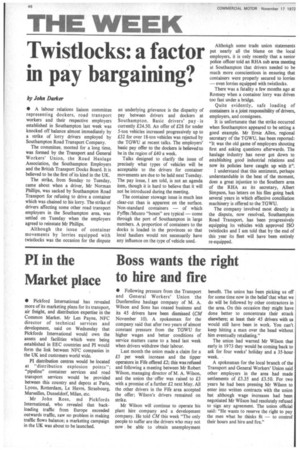Twistlocks: a factor in pay bargaining?
Page 52

If you've noticed an error in this article please click here to report it so we can fix it.
by John Darker
• A labour relations liaison committee representing dockers, road transport workers and their respective employers established in Southampton last week was knocked off balance almost immediately by a strike of lorry drivers employed by Southampton Road Transport Company.
The committee, mooted for a long time, was formed by the Transport and General Workers' Union, the Road Haulage Association, the Southampton Employers and the British Transport Docks Board. It is believed to be the first of its kind in the UK.
The strike, from Sunday to Tuesday, came about when a driver, Mr Norman Phillips, was sacked by Southampton Road Transport for refusing to drive a container which was chained to his lorry. The strike of drivers affecting some other road transport employers in the Southampton area, was settled on Tuesday when the employers agreed to reinstate Mr Phillips.
Although the issue of container movements by lorries equipped with twistlocks was the occasion for the dispute an underlying grievance is the disparity of pay between drivers and dockers at Southampton. Basic drivers' pay is currently £24.50. An offer of £28 for under 5-ton vehicles increased progressively up to £32 for over 18-ton vehicles was rejected by the TGWU at recent talks. The employers' basic pay offer to the dockers is believed to be in the region of £40 a week.
Talks designed to clarify the issue of precisely what types of vehicles will be acceptable to the drivers for container movements are due to be held next Tuesday. The pay issue, I am told, is not an agenda item, though it is hard to believe that it will not be introduced during the meeting.
The container stowage issue is much less clear-cut than is apparent on the surface. Non-standard containers — of which Fyffes /Munro "boxes" are typical — come through the port of Southampton in large numbers. A proportion of containers to the docks is loaded in the provinces so that local hauliers would not necessarily have any influence on the type of vehicle used. Although some trade union statements put nearly all the blame on the local employers, it is only recently that a senior police officer told an RHA sub area meeting at Southampton that drivers needed to be much more conscientious in ensuring that containers were properly secured to lorries — even lorries equipped with twistlocks.
There was a fatality a few months ago at Romsey when a container lorry was driven too fast under a bridge.
Quite evidently, safe loading of containers is a joint responsibility of drivers, employers, and consignees.
It is unfortunate that the strike occurred when Southampton appeared to be setting a good example. Mr Ernie Allen, regional secretary of the TGWU, has been reported: "It was the old game of employers shooting first and asking questions afterwards. The haulage industry has never got down to establishing good industrial relations and now its policies have caught up with it".
I understand that this sentiment, perhaps understandable in the heat of the moment, does a great injustice to the Southern area of the RHA as its secretary, Albert Simpson, has letters on his files going back several years in which effective conciliation machinery is offered to the TGWU.
The company involved most directly in the dispute, now resolved, Southampton Road Transport, has been progressively equipping its vehicles with approved ISO twistlocks and I am told that by the end of this year its fleet will have been entirely re-equipped.
































































































































































